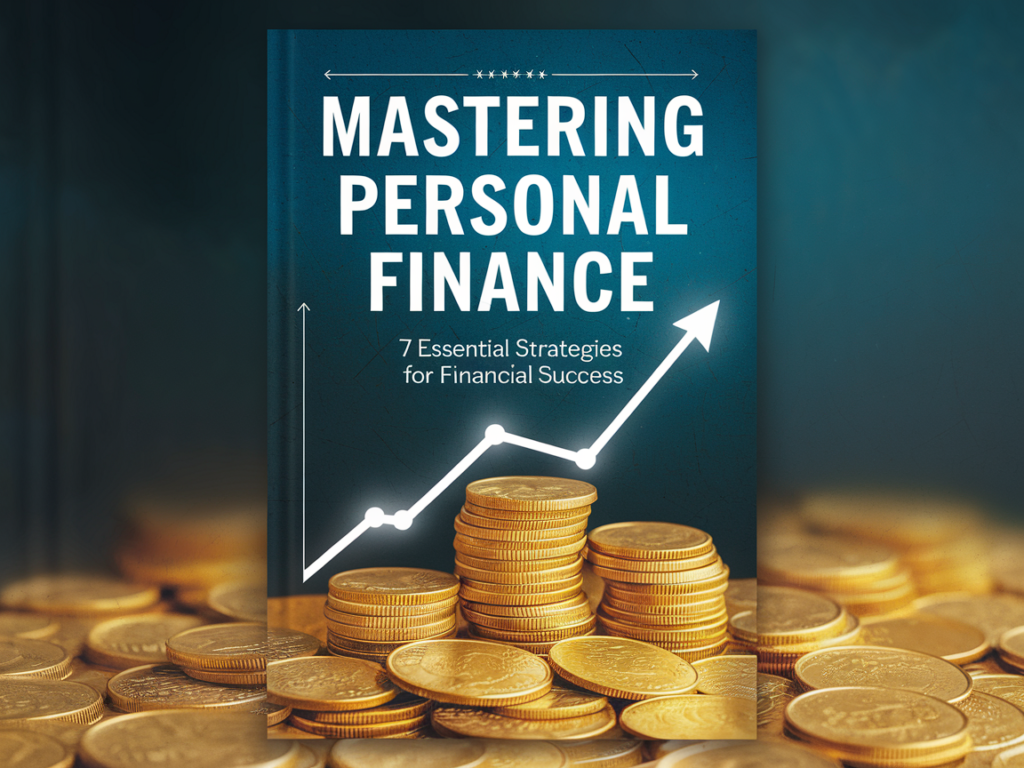Meta Description:
Discover 7 essential personal finance strategies to achieve financial success. From budgeting and saving to investing and insurance, these tips will help you take control of your financial future.
Mastering Personal Finance: 7 Essential Strategies for Financial Success
In today’s fast-paced world, managing personal finance is more crucial than ever. Whether you’re just starting out on your financial journey or looking to take your finances to the next level, understanding the basics of budgeting, saving, investing, and planning is essential for achieving long-term financial security. In this article, we’ll explore seven essential strategies that can help you take control of your financial life and set yourself up for success in the world of finance.
1. Start with a Clear Financial Plan

Before you can achieve financial success, it’s important to have a clear plan. A financial plan outlines your short-term and long-term finance goals, whether it’s buying a home, paying off debt, or saving for retirement. Start by assessing your current financial situation—how much do you earn, what are your expenses, and where do you stand in terms of debt and savings? With this information, you can develop a plan that prioritizes your finance goals and keeps you focused.
Tip: Break your finance goals into manageable steps. For example, if your goal is to save for a house, aim to save a specific amount each month and adjust based on your progress.
2. Create a Realistic Budget
One of the most important financial habits you can develop is creating and sticking to a budget. A budget helps you control your spending, save money, and avoid unnecessary debt. To build a successful budget, start by listing all your sources of income, then categorize your expenses (such as housing, groceries, utilities, entertainment, etc.). Tracking your expenses regularly is key to ensuring you’re staying on top of your finance plan.
Tip: Consider using budgeting apps like Mint or YNAB (You Need a Budget) to track your expenses automatically, which can save time and help you stay organized in managing your finances.
3. Build an Emergency Fund

An emergency fund is one of the most important tools for financial security. Life is unpredictable, and having an emergency fund ensures that you’re financially prepared for unforeseen events, such as job loss, medical emergencies, or major car repairs. Aim to set aside three to six months’ worth of living expenses in a separate savings account that’s easy to access.
Tip: Start small and build your emergency fund gradually. If necessary, set up automatic transfers to your emergency savings account to make the process effortless, ensuring you have adequate finance protection for unexpected situations.
4. Tackle Debt Efficiently
Debt is one of the biggest obstacles to achieving financial freedom, but it’s possible to manage and eliminate it with the right strategy. The first step in tackling debt is understanding how much you owe and at what interest rates. Once you have a clear picture, decide on a debt repayment strategy. The two most popular methods are the debt snowball (where you focus on paying off the smallest debt first) and the debt avalanche (where you focus on paying off the highest-interest debt first).
Tip: If you have high-interest debt, consider consolidating or refinancing to reduce interest payments. Many financial institutions offer options for consolidating credit card debt at a lower interest rate, helping you optimize your finance goals.
5. Start Saving and Investing Early
Saving and investing are essential for building wealth over time. While saving ensures that you have money set aside for short-term finance goals, investing allows your money to grow for long-term goals, like retirement. The earlier you start investing, the more time your money has to grow, thanks to compound interest. Even small contributions to an investment account, such as a 401(k), IRA, or brokerage account, can add up significantly over time.
Tip: If your employer offers a 401(k) match, contribute enough to take full advantage of the match—it’s essentially free money for your retirement, which will pay off as part of your broader finance strategy.
6. Focus on Retirement Planning
Retirement may seem far off, but the earlier you start planning for it, the better. Contributing to retirement accounts like a 401(k), IRA, or Roth IRA can help you build wealth and secure your financial future. The key to retirement planning is consistency—make regular contributions, and take full advantage of tax-advantaged accounts to minimize your tax burden.
Tip: Review your retirement finance goals annually to make sure you’re on track. Adjust your contribution amounts as your income increases, and make sure to diversify your investments for long-term growth.
7. Review Your Insurance Needs

Insurance is an often-overlooked but essential part of personal finance. Health, life, auto, and home insurance are all designed to protect you and your family from financial hardship in case of emergencies. Make sure you’re adequately covered based on your personal circumstances. For example, if you have a family, life insurance may be a wise investment. If you own a home, homeowners insurance is crucial.
Tip: Periodically review your insurance policies to ensure you’re not paying for unnecessary coverage or that you’re adequately protected as your life circumstances change, ensuring your finances remain secure.
FAQs:
1. How do I create a budget that works for me?
Start by tracking your income and all expenses. Categorize your spending into needs, wants, and savings, then allocate funds accordingly. The key is to be realistic about your spending habits and stick to your budget.
2. How much should I save in my emergency fund?
Aim for three to six months’ worth of living expenses. This will ensure you have enough to cover unexpected expenses without derailing your financial stability.
3. What’s the best way to pay off debt quickly?
Focus on the debt with the highest interest rate (debt avalanche method) or the smallest debt (debt snowball method). Consider consolidating high-interest debts for a lower rate if possible.
4. When should I start saving for retirement?
The earlier, the better! Start contributing to retirement accounts like a 401(k) or IRA as soon as possible, even if it’s just a small amount. This gives your investments more time to grow.
5. How do I know if I have enough insurance coverage?
Regularly review your policies based on life changes. If you’ve had a significant life event like marriage, children, or purchasing a home, adjust your insurance coverage accordingly.
External Resources:
- Investopedia – Personal Finance Basics
- NerdWallet – Building an Emergency Fund
- The Balance – Debt Repayment Strategies
- IRS – Retirement Plans
- Consumer Reports – Insurance Guide
By applying these seven essential strategies, you can start mastering your personal finance today. Building wealth, eliminating debt, and preparing for the future might take time, but with persistence and the right approach, financial success is within reach.


